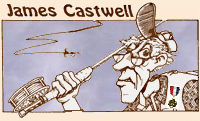|
I can still see the bobber. A pear shaped cork
with a stick through it just sitting out there
on the surface of the pond. My dads brothers and
I were after perch in southeastern Michigan about
1940 or so. We were in a very crowded row-boat. I
had been kind of reeling in my line a bit, figured
it might help get a fish. I was admonished to just
leave it sit out there until it went under. Now it
was jiggling like crazy but the darn thing would
not go down. This time I was informed that I had
a fish on and I should reel in. For me fishing
remains a bit of a mystery to this day. What to
do and when to do it.
I also remember the bait we used. Grubs, freshly
dug from a steaming pile in the corral of the
horse-barn of the local creamery. I soon learned
to have more regard for worms; red, earth and night
crawlers. The rigs we fish with remain about the
same to this day though. A bobber on top which will
have enough buoyancy to hold a hook at the proper
depth. Here I must admit that a bobber and a
strike-indicator are not really the same thing,
although I staunchly will never admit that in
public. An indicator will not (well, it's not
supposed to) hold a hook at any given depth,
whereas a bobber will. Case closed.
The things we learn as youngsters tend to stay with
us into latter years. The large dry fly with a dropper
from the hook to a tiny nymph. Is this a bobber
assembly? Sure, but so what? It works. A small bit
of foam at the line-leader junction is not. But,
again, so what, it too works. So, how the heck
did the original method get lost?
Yes, the Original method!
Because as children we were not taught to fish
the original way.
Once upon a time... Yes, that far back, when rods
were once very long, the fly was tied to the very
end of the leader. The rod was held up and the wind
would blow the line out over the water. Fishing was
done with a gentle breeze behind ones back. If one
could find a place where the fly could be presented
upstream so much the better.
But the wind did not always co-operate, rarely in fact.
A more advanced (you 'Advanced' guys listen up here)
method had to be found. And was. Tie a heavy fly (wet,
streamer etc) on the very end. Up from it a ways,
(from a dropper) hang down a smaller DRY fly! This
rig was fished downstream, or at best, somewhat upstream
and swung down and across. The heavy fly would hold in
the moving current of the stream and by skillfully
manipulating the angle of the line, one could 'dance'
the dry fly on the surface ahead of the nail fly.
As you can see, that is backwards of how it is done
by today's enlightened nimrods. Could we do it that
way with our nine foot or longer rods today? Sure.
But we don't. Why not? Would it seem unethical,
immoral, cheating or even illegal? How about a
big juicy woolly-bugger for the nail fly and a
nice variant or dry spider up above it? Dance that
puppy around on your favorite stream a bit.
To those of you who may have been offended by this
heresy, I apologize. To the rest of you, sometimes
you just have to turn a idea on it's head to make
any progress; forward or backward. ~ James Castwell
|



